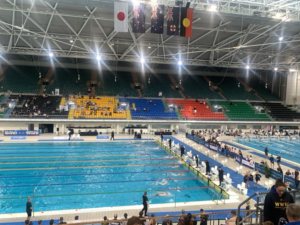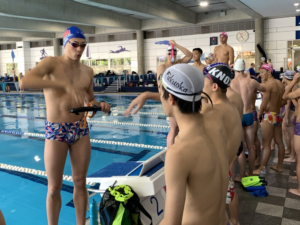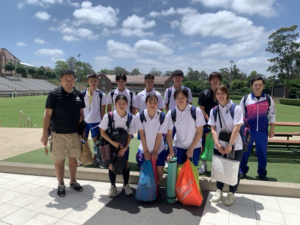~ Articles and Photos by Melissa Gibbs,
Deputy Director of Australian Centre of Excellence for Local Government (ACELG) ~
Seminar participants with CLAIR Managing Director
Left to right: Penelope Sell, Laurie Mundt, Melissa Gibbs, CLAIR Managing Director, Susan Jones, Keith Tong, Milinda Peris
In November I had the privilege of leading a delegation of six Australian and New Zealand local government representatives to Tokyo and Sakaide City as part of the 2014 Local Government Exchange and Co-operation Seminar organised by the Japan Council of Local Authorities for International Relations (CLAIR).
The Local Government Exchange and Co-operation Seminar has been operating since 1997. It brings together people from Japan, Australia and New Zealand working in local government to exchange information and experiences.
The exchange presents a unique opportunity for Australian and New Zealand representatives to learn more about Japanese local government and culture through site visits, a delightful home stay experience with Japanese families, and formal and informal discussion sessions.
The theme of this year’s seminar was “making the best of regional characteristics”, a subject to which each of the participants had ideas and suggestions to contribute.
The delegation included:
- Melissa Gibbs (delegation leader), Deputy Director, Australian Centre of Excellence for Local Government (Sydney, NSW)
- Councillor Keith Yong, City of Perth (WA)
- Laurie Mundt, Economic Development Manager, Ipswich City Council (Qld)
- Milinda Peris, Civic and International Relations Co-ordinator, Christchurch City Council (NZ)
- Penelope Sell, Community Services Manager, Towong Shire Council (Vic)
- Susan Jones, Human Resources and Administration Manager, District of Gore (NZ).
Seminar participants with Sakaide City Officials
Like many of its counterparts in Japan, Australia and New Zealand, Sakaide City is striving to build on its strengths to secure its sustainability amidst decreasing population levels and challenges in attracting and retaining an industrial and tourism base.
On the positive side, the City boasts an impressive array of opportunities, including its location in the centre of Kagawa Prefecture on the island of Shikoku with good transport access to Honshu Island (the main island of Japan) via the truly striking Seto-Ohashi Bridge; agricultural products such as red sweet potato (kintoki-imo), red carrot (kintoki-ninjin) and red mandarin oranges (kintoki-mikan); a national reputation for producing high quality udon noodles (which we discovered must be slurped – loudly!) made from high quality Australian wheat ; and the spiritual Shikou Pilgrimage known for its 88 temple circuit and associated cultural heritage.
On top of the Seto-Ohashi Bridge & The view from the top of the Seto-Ohashi bridge
Following a series of seminars on Japanese local government in Tokyo and Sakaide City, tours and site visits of national and local facilities and cultural sites, and a home stay with Japanese families, there was an opportunity for an open exchange of views between Seminar participants and City officials about the challenges and opportunities facing Sakaide City.
Australian and New Zealand delegates were able to offer a number of ideas and opinions to assist Sakaide in leveraging its many opportunities and addressing its challenges.
Ideas included:
- Further engaging with citizens to develop a shared vision for the future of Sakaide City and developing plans and strategies toward this common vision
- Identifying and assisting to meet the needs of business; making it easier for businesses to relocate to Sakaide City; and providing and maintaining supporting infrastructure to retain the businesses already in the City
- Building on the positive relationship with Kagawa University to improve education opportunities for young people
- Providing recreation and education opportunities for families and young people so they don’t need to travel outside of the City to access such facilities
- Packaging and integrating tourism experiences to the burgeoning market seeking cultural and spiritual experiences, particularly highlighting the Shikou Pilgrimage and associated activities
- Further promotion and development of tourism experiences focused on the Seto-Ohashi Bridge, which is an easily recognisable and internationally renowned landmark in the city
- Further developing local agricultural advantages through the promotion of red sweet potato (kintoki-imo), red carrot (kintoki-ninjin) and red mandarin oranges (kintoki-mikan), and the promotion of locally produced udon noodles
- Building on the sister city relationship with Sausalito in the Unites States.
For its part, ACELG is keen to share its research findings with CLAIR and Sakaide City, particularly in relation to the leadership role played by local government in developing regions, as well as research aimed at enhancing local government international alliances, to which CLAIR Sydney is contributing.
Australia, New Zealand and Japan have much to share and the Local Government Exchange and Co-operation Seminar offers opportunities for the formation of country-to-country and, perhaps most importantly, people-to-people relationships to underpin information and knowledge exchange.
Learning to play the Koto
Seminar participants at the udon noodle factory
It was an honour and a privilege to lead the 2014 delegation to Tokyo and Sakaide City.
On behalf of the Australia and New Zealand delegation, I extend my sincere thanks to the CLAIR offices in Sydney and Tokyo, and to Mayor Hiroshi Aya and staff of Sakaide City, for arranging such a diverse range of experiences for us to engage in.
We experienced everything from mandarin picking, udon noodle making, visits to local schools, a breathtaking climb right to the top of the Seto-Ohashi Bridge, the Shikou Pilgrimage to two of the 88 magnificent temples, and a home stay with families of Sakaide City – it was truly a professionally and personally rewardingexperience for us all.
Melissa Gibbs making a presentation on Australian local government to Sakaide City officials
Melissa Gibbs
Deputy Director
Australian Centre of Excellence for Local Government (ACELG)
melissa.gibbs@acelg.org.au
+61 2 9514 4890
Please see more information about this seminar’s schedule.

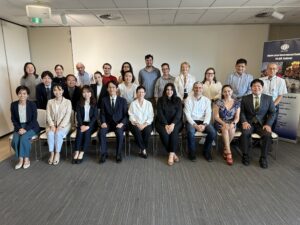
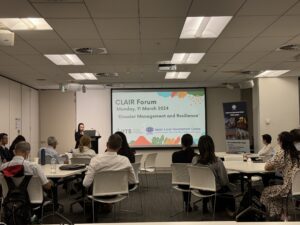
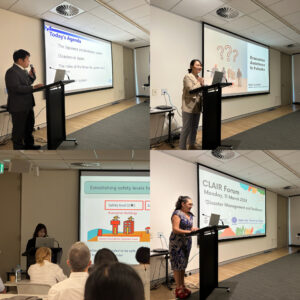
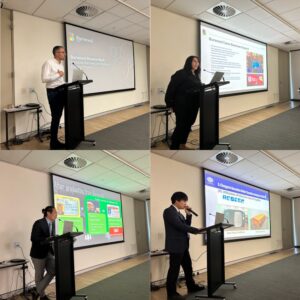
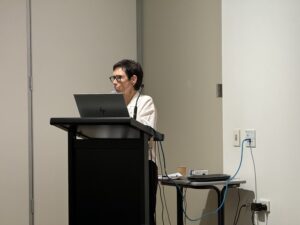
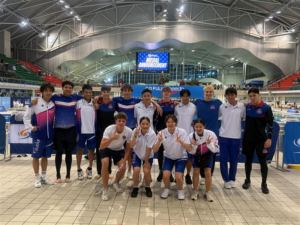 From the 3rd to the 13th of December, eight selected swimmers from the Fukuoka Swimming Association visited NSW, where they participated in joint training sessions with a local school and competed in the 2024-25 Speedo NSW Senior State Age Championships.
From the 3rd to the 13th of December, eight selected swimmers from the Fukuoka Swimming Association visited NSW, where they participated in joint training sessions with a local school and competed in the 2024-25 Speedo NSW Senior State Age Championships.